 If you are looking to setup a store quickly and easily, a hosted shopping cart is probably the best way to go.
If you are looking to setup a store quickly and easily, a hosted shopping cart is probably the best way to go.
There are also some paid ecommerce solutions out there that don’t include hosting, but differ from the free solutions, because they might have slightly more features, or offer technical support.
There are also some paid solutions that offer less or nothing more than what is offered by some of the free solutions.
Of course, even the free solutions require you to register a domain and have some type of web hosting. This too comes at a price, but that price is usually pretty low (in my opinion).
You can read more about registering a domain name here and signing up for a web hosting plan here.
So you basically just have to ask yourself, “what is good for my business?”
If you have a very successful business, the fees charged by some of the paid solutions listed on this page may not seem like much.
Also, if you are a very busy person, a hassle free solution may be worth every penny.
Personally, I’ve tried some of the paid solutions, as well as some of the free ones, so I’m not going to recommend one over the other. I do, however, give my take on them.
So, take your time and choose wisely, because if in the future you decide to switch to another solution, it’s not always as easy as when you initially setup your store.
In this article, I actually go over some of the things you should be aware of when and if you decide to make the switch.
Now, here is the list:
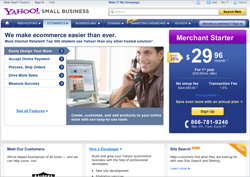 Yahoo Merchant Solutions E-Commerce
Yahoo Merchant Solutions E-Commerce
Yahoo offers a turn key ecommerce solution for which they charge a monthly fee as well as a transaction fee for each item sold. For more details, please see this page.
Included is an easy to build online store, hosting and a domain name.
Overview:
- Charges monthly fees plus transaction fees.
- Includes hosting & domain name.
- Easy web based store design (capable of handling custom designs via HTML).
- Web based interface used to set up a basic store (requires no programming knowledge).
- Sell physical or downloadable products.
- Offers technical support.
- Offers a discount towards Yahoo! Shopping listings.
- SEO friendly.
- SSL encryption.
Pros:
You can setup your entire store through a web-based interface.
Discount towards a Yahoo! Shopping listing — special terms may apply so please look into this prior to setting up a store.
Search engine friendly.
Nice set of features including coupons, sale pricing, volume discounts, customizable site search and more.
Cons:
You can only accept payment via a merchant account that is FDMS gateway compatible or via Paypal.
Their store platform doesn’t appear to be mobile friendly. I have seen add-ons available online which can make a Yahoo powered store mobile friendly, but they seem pricey.
Automatically calculated shipping rates are only available through UPS.
Some features (like cross-selling) which are standard features even on some free ecommerce solutions these days, are only available in the higher priced Yahoo plans.
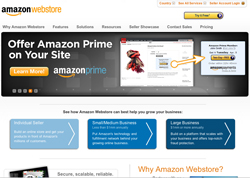 Amazon offers easy to setup hosted stores for which they charge a monthly fee plus a transaction fee for each item sold.
Amazon offers easy to setup hosted stores for which they charge a monthly fee plus a transaction fee for each item sold.
An Amazon Webstore should not be confused with Webstore By Amazon, because unlike with Webstore By Amazon (which is part of the Amazon marketplace), an Amazon Webstore is a real store.
Which means that you get more control over the design, marketing and more.
Also, you get to have your own web address (a domain). If you already have a domain, you can point the existing domain at your webstore.
If you don’t already have a domain, you can set one up through the domain registrar(s) that Amazon recommends via the Amazon Seller Central administration, or you can use a domain registrar of your choice — we actually have some tips on setting up a domain here.
For more details, please see Amazon’s pricing structure here.
Overview:
- Charges monthly fees plus transaction fees.
- Includes hosting.
- Easily configure your store’s design with built-in completely customizable templates.
- Web based used to setup up a basic store (requires no programming knowledge).
- Offers technical support.
- Add Amazon Prime to your store.
- SEO friendly.
- SSL encryption.
Pros:
Web-based interface from start to finish.
Easily accept credit card payments online or offline through Amazon.
Accept Checkout by Amazon which enables people to shop your store through their Amazon.com accounts.
You can offer Amazon Prime in your store.
An Amazon Webstore enables you to sell your items on Amazon.com quickly and easily (additional fees may apply).
You have access to Fulfillment by Amazon.
Nice features: product recommendation engine, product ratings & reviews, coupons & discounts and more.
Cons:
An Amazon Webstore is really geared towards Amazon in some ways. For example, you can only use Amazon credit card processing services in your store.
I have checked some of the stores listed in the Webstore Gallery and they don’t appear to be mobile friendly.
The shipping setup is very limited.
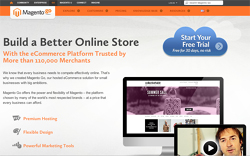 Since you may already be familiar with Magento, I’d like to clarify that Magento Go is a hosted ecommerce solution unlike the Magento community edition which would require you to download the Magento software and install it on a server or web hosting account manually — I actually cover the Magento community edition here.
Since you may already be familiar with Magento, I’d like to clarify that Magento Go is a hosted ecommerce solution unlike the Magento community edition which would require you to download the Magento software and install it on a server or web hosting account manually — I actually cover the Magento community edition here.
For details on Magento Go’s pricing, please see this link.
You can use an existing domain or if you don’t have one, you can register one and point it at your Magento store.
You do get a subdomain with a Magento plan but this is not something that I would recommend because to build a real brand online, you should have your very own web address (it’s not like it costs much to register one these days). I actually go over how to register a domain name for your store here.
Overview:
- Charges monthly fees based on your needs — these fees vary based on how many items you plan to list in your store.
- Includes hosting.
- Easily design your store with themes, design editor and more.
- Web based interface used to setup a basic store (requires no programming knowledge).
- Sell physical or downloadable products.
- Offers technical support.
- SEO friendly.
- SSL encryption available as an add-on.
Pros:
Does not charge transaction fees.
Too many features to list.
Many payment options to choose from: Authorize.net, Google Wallet (formerly Google Checkout), Paypal and more.
Many shipping options to choose from: real-time calculated shipping rates from major shipping providers, flat rate, free shipping, table rate and more.
You can use extensions (add-ons) to add even more features to your store.
Cons:
From what I’ve seen in the Magento customer showcase, it appears that these stores aren’t mobile friendly. Personally, I find this odd because the Magento community addition is. Therefore, I can only assume that this is due to the Magento Go edition themes.
Limitations on how many items you can list. Therefore, if you have a very large inventory, you will have to purchase a higher priced plan.
 Shopify offers many features but the cost of the plans vary. For example, a plan that costs less per month has higher transaction fees per item sold.
Shopify offers many features but the cost of the plans vary. For example, a plan that costs less per month has higher transaction fees per item sold.
Also each plan has restrictions on how many items you can list in your store. For pricing details, please see this link.
You can use an existing domain or register a new one for your Shopify store.
Overview:
- Charges a monthly fee plus transaction fees (Monthly fees and transaction fees vary based on plan. Plans vary based on features and limitations).
- Includes hosting.
- Many themes to choose from which allow you to customize your store’s design through an online interface.
- Easily setup your store through a web based interface (no programming skills required).
- Sell physical or downloadable products.
- Offers technical support.
- SEO friendly.
- Mobile friendly.
- SSL encryption.
Pros:
A very long list of payment methods. Choose from: Authorize.net, Chase Paymentech, FirstData US, Google Wallet (formerly Google Checkout), Moneybookers, Paypal, SagePay and so many more. For a complete list, check out this page.
Allows you to import your inventory in bulk through an Excel or CSV file, Ebay or Magento.
Shopify stores are mobile friendly.
Shopify offers an app store which offers addition features (add-ons) for your store — there are free and paid ones available.
Cons:
The “discount code coupon engine” and real-time calculated shipping rates features are only available in the higher priced plans.
Limitation on how many items you can list in your store. If you have a very large inventory, you will need to purchase a more expensive plan.
Homestead Online Store (An Intuit Company)
 I initially came across Intuit’s ecommerce solution and while watching the video I noticed that their ecommerce solution is actually powered by Homestead (also an Intuit brand), so I decided to review the solutions offered on the Homestead website because it seems more like the source — if that makes any sense…
I initially came across Intuit’s ecommerce solution and while watching the video I noticed that their ecommerce solution is actually powered by Homestead (also an Intuit brand), so I decided to review the solutions offered on the Homestead website because it seems more like the source — if that makes any sense…
Also both products seem to be the same — as far as I was able to notice — therefore this review will apply to the ecommerce solutions offered on both sites. Here is the link to the Intuit site so that you can check for yourself.
For pricing information, please see this link — though, I must say that it’s difficult to find detailed information about the packages on the site…
Luckily, by really digging around, I managed to find more information here.
As far as domains are concerned, you can transfer or point an existing domain to your site, or purchase a new domain through Homestead/Intuit.
Overview:
- Charges monthly fees (some packages do not offer a storefront by default) and sells add-ons. Some packages have limitations on how many products you can list.
- Includes hosting.
- Offers a way to easily customize your store’s design.
- Easily setup your storefront through a web based interface (no programming skills required). They can setup the store for you at an additional cost.
- Sell physical or downloadable products. Please note: the ability to sell downloadable products might only be available on some versions.
- Offers technical support.
- SEO friendly.
- SSL encryption.
Pros:
Does not charge transaction fees on items sold.
Nice features to help get your store up and running.
It’s scalable which is good if you need a very simple store.
You can accept a few different payment options. Intuit merchant service and Paypal are amongst them.
Offers regularly updated table rates from Fedex, UPS, USPS and Canada Post.
Cons:
Sites don’t appear to be mobile friendly.
It’s very difficult to find detailed information about the packages being offered.
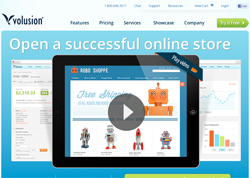 I heard about Volusion quite a few years ago because their name was literally everywhere. While visiting the Volusion site in preparation for this review, I actually came across this:
I heard about Volusion quite a few years ago because their name was literally everywhere. While visiting the Volusion site in preparation for this review, I actually came across this:

Now, I have heard about this book before but never realized that it was written by Volusion… You’ve just gotta love the headline: “We wrote the book on ecommerce!” — is this awesome advertising or what? They will basically give you a free copy of this book with the purchase of any store plan. I just don’t know for how long, so if this deal is no longer valid, please don’t blame me 🙂
While this has very little to do with their online store software, the ad really caught my attention so I figured I’d share…
Aside from that, Volusion does offer plenty of services and their shopping cart has plenty of features. You can check out the prices and details here.
As for the domain, you can forward or transfer an existing one, or purchase one through Volusion.
Overview:
- Charges monthly fees which vary based on limitations, features and support. For example, limitations include how many items you can list and data transfer size. Higher priced plans include priority support, onboard coaching, Ebay integration and more.
- Includes hosting.
- Offers various free templates which can be used to easily customize your store’s design.
- A web based interface makes it easy to setup your store (no programming skills required).
- Sell physical or downloadable products.
- Offers technical support.
- SEO friendly.
- Mobile friendly.
- Capable of handling SSL encryption.
Pros:
Offers many features. I won’t list all of them, but I do find the deal of the day feature and the Facebook store feature pretty cool. You can see more features here.
Mobile version included.
Many different payment options to choose from — check out the list.
Choose from many different shipping options including live rates.
Cons:
SSL certificates are not included in their store plans. This is a bit disappointing to me because most hosted shopping carts come with SSL encryption included.
Ebay integration isn’t available at entry level plans.
CS-Cart Shopping Cart Software
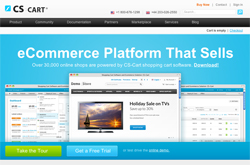 CS-Cart offers one-time payment non-hosted shopping cart software. A demo of the software can be found here and pricing is available here.
CS-Cart offers one-time payment non-hosted shopping cart software. A demo of the software can be found here and pricing is available here.
Since this isn’t a hosted solution, installing CS-Cart does require basic knowledge of how FTP, MYSQL and servers function.
Also be sure to check the system requirements prior to purchasing a hosting plan.
In addition to this, you can use an existing domain or purchase a new one, and from what I’ve read on the CS-Cart site, you must inform CS-Cart about the domain you are using so that they know that a license has been purchased for that particular store…
Overview:
- Charges a one-time fee which varies based on edition. For example, CS-Cart offers software which can be used to setup an online marketplace, as well as one that can operate multiple storefronts — these of course, are the more expensive editions.
- Storefront and admin panel uses templates for design and layout.
- Operating the store doesn’t require technical skills.
- Sell physical or downloadable products.
- Offers technical support for a limited time.
- SEO friendly.
- Mobile friendly.
- Capable of handling SSL encryption.
Pros:
Offers many features.
Mobile version included.
Create and list unlimited categories and products.
No transaction fees on items sold.
Plenty of shipping options to choose from: real-time calculated rates from FedEx, DHL, USPS, Australia Post, Canada post; Intershipper real-time calculations; customizable shipping surcharges; free shipping; custom delivery methods; custom-defined destinations and more.
A huge list of payment methods that you can accept: Amazon Payments, Authorize.net, Google Wallet (formerly Google Checkout), Paypal, 2Checkout, Moneybookers, HSBC, Sage Pay and more.
Cons:
The only downside is that you have to install the software manually — which is similar to what you get with free ecommerce solutions. CS-Cart does, however, offer an installation package but it costs extra.
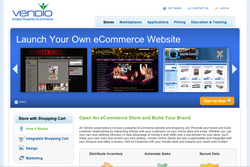 Vendio has been offering ecommerce solutions for quite some time now.
Vendio has been offering ecommerce solutions for quite some time now.
I initially found out about them through their picture hosting service, but they offer plenty of solutions — including but not limited to: Facebook store app, Ebay tools, marketing tools, store platform and much more.
A video of their platform can be viewed here and pricing is available here.
Overview:
- Charges monthly fees that vary based on your store’s size. For example, if you are planning on listing a lot of items, you would pay more.
- Includes hosting and domain.
- Templates make it easy to design your store.
- A web based interface makes it easy to get your store up an running (no programming skills required).
- Offers technical support.
- SEO friendly.
- Mobile friendly.
- SSL encryption.
Pros:
A great platform if you sell on Amazon or Ebay because it allows you to import items easily. The platform also allows you to sync your inventory across all channels — to keep you from having to manage each platform individually.
No transaction fees.
Mobile version included.
Facebook store included.
Accept Authorize.net, Google Wallet (formerly Google Checkout), Paypal and more for payment.
Cons:
A great solution if you sell on Amazon or Ebay, but if you are looking for just a basic store, it can feel like you are paying more. Vendio does offer a custom option but I haven’t contacted them to see what it’s all about — maybe there is a way to exclude some features, but then again, they do list Ebay and Amazon even in that plan…
ProStores Store (An Ebay Company)
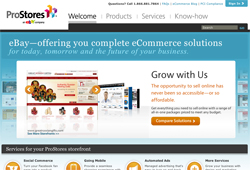 If you sell on Ebay, you have most likely heard of ProStores. If you haven’t, you can read more about the features and cost here.
If you sell on Ebay, you have most likely heard of ProStores. If you haven’t, you can read more about the features and cost here.
Interestingly, Ebay owns both ProStores and Magento (which we cover in this article as well as this one), so you may want to evaluate both solutions — here ProStores sheds some light on this and offers a way to help you decide — personally, I found this odd because Magento makes very little mention of Ebay.
As far as domains are concerned, you can purchase one through the ProStores site or you can use an existing domain.
Overview:
- Charges monthly fees plus transaction fees. Monthly fees vary based on your needs. For example, if you sell a lot of products, you will need a more expensive plan. Also, some features are only available in the more expensive plans.
- Includes hosting.
- Easily design your storefront through a web based interface.
- Setup your store through a web based interface (no programming skills required).
- Sell physical or downloadable products.
- Offers technical support.
- SEO friendly.
- SSL encryption.
Pros:
If you sell on Ebay, ProStores may be a very good solution for you. After all, who would know more about integrating with Ebay than Ebay themselves?
Compatible with many payment providers including Authorize.net, Paypal (of course) and a few others.
Many shipping methods to choose from, custom tables; calculated rates from UPS, USPS, Canada Post; flat rate and more.
Cons:
No mobile version. Add-ons are available from other software providers but those cost extra.
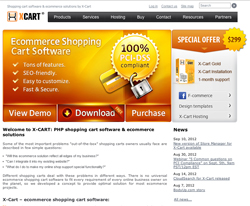 X-Cart offers both a hosted and non-hosted shopping cart solution. There are multiple versions of the X-Cart software. You can view pricing information here.
X-Cart offers both a hosted and non-hosted shopping cart solution. There are multiple versions of the X-Cart software. You can view pricing information here.
Overview:
- Charges a one-time fee for the software — there are multiple versions of this software available.
- By default, this is a non-hosted solution but X-Cart does offer hosting and/or installation services.
- Template driven design makes it easy to customize your store.
- Operating your store doesn’t require technical skills.
- Sell physical or downloadable products.
- Offers technical support for a fee.
- SEO friendly.
- Capable of handling SSL encryption.
Pros:
I was looking at the demo store and some of the templates really look professional — you can view a demo here.
No transaction fees.
Many payment options to choose from: Amazon Payments, Google Checkout, Authorize.net, Moneybookers and more.
Integrates with USPS, UPS, FedEx, DHL, Canada Post, Australia Post and more.
Has a marketplace available for add-ons which can be viewed here.
Cons:
No mobile version available by default. Add-ons are available in the X-Cart marketplace.
Technical support must be purchased.

 3DCart, the company that wrote the book titled “Online Stores for Dummies” offers a hosted solution with plenty of today’s most sought after features, for which they charge a monthly fee. For more details on pricing, please see this link.
3DCart, the company that wrote the book titled “Online Stores for Dummies” offers a hosted solution with plenty of today’s most sought after features, for which they charge a monthly fee. For more details on pricing, please see this link.
If you already have a domain, you can transfer it over to 3DCart or you can register a new one through them.
Overview:
- Charges monthly fees based on your needs — if you sell a lot of items, you will need to go with a more expensive plan.
- Includes hosting and domain.
- Fully customizable design — basic designs require no programming skills.
- Setup your store through a web based interface (requires no programming skills).
- Sell physical or downloadable products.
- Offers technical support.
- SEO friendly.
- Some plans offer a store that is mobile friendly — you can read more about this here.
- SSL encryption.
Pros:
I was browsing some of the sites that use 3DCart and I am very impressed with the look and feel of the software.
No transaction fees.
Choose from a long list of payment options: Amazon Payments, Authorize.net, Google Wallet (formerly Google Wallet), Moneybookers, Paypal and more — see this list for details.
Integrates with UPS, FedEx, USPS and Canada Post for real-time shipping calculations. Many other shipping options to choose from: custom tables, multiple ship to, Endicia and Galaxy integration and more.
Cons:
3DCart has many nice features. Unfortunately, some feature like “mCommerce” and “Facebook Store” aren’t available on entry level plans.
Nexternal Hosted Shopping Cart
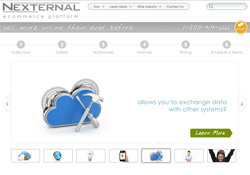 Nexternal offers a professional ecommerce solution that has plenty of useful features.
Nexternal offers a professional ecommerce solution that has plenty of useful features.
While the plans aren’t cheap, they can be cost effective for businesses that sell a lot of merchandise. For more details on pricing, please see this link.
Nexternal stores are initially setup on subdomains of Nexternal.com, it is possible to use your own domain name — which is something that I strongly recommend — for more info, please see this link.
Overview:
- Charges monthly fees or percentage of sales.
- Includes hosting.
- Setup your store through a web based interface (no programming skills required).
- Offers technical support.
- SEO friendly.
- Mobile friendly.
- SSL encryption.
Pros:
Offers plenty of tools which are necessary to succeed online today.
Integrates with UPS, FedEx, DHL and USPS for real-time shipping calculations.
Cons:
Doesn’t offer the option to sell downloadable products by default. They do, however, have partners that can extend the functionality of your store so that you can sell downloads — for a fee of course.
Doesn’t offer many payment options to choose from. For example, you can only accept: Chase Paymentech, Authorize.net and Paypal.
If you operate a very small store that doesn’t generate many sales, this solution may be a bit pricey.
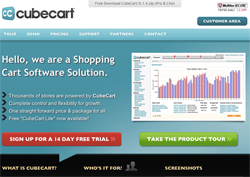 In another article I cover the CubeCart Lite version which is free. The free version has limitations on how many orders and customers you can have, as well as, some features not being available.
In another article I cover the CubeCart Lite version which is free. The free version has limitations on how many orders and customers you can have, as well as, some features not being available.
With the paid version you have no limitations and all of the features which aren’t available in the free version. For more info, please see this link.
Both CubeCart versions are non-hosted. Which means that you have to install the software on a server or hosting plan yourself. Or, you can of course hire someone to do this for you.
If you are planning to install the software yourself, you should familiarize yourself with how MYSQL, servers and FTP works.
Also, prior to ordering a web hosting plan, you should check the server requirements for CubeCart.
Of course since this software is self hosted, you can use a personalized domain.
Overview:
- Charges a one-time fee.
- Templates are used for your store’s design.
- No programming skills are required to operate your store since it’s all done through a web based interface.
- Sell physical or downloadable products.
- Offers technical support for a limited time.
- SEO friendly.
- Mobile friendly.
- Capable of handling SSL encryption.
Pros:
No transaction fees.
No monthly fees.
Plenty of payment options to choose from: 2Checkout, Authorize.net, Google Wallet (formerly Google Checkout), Moneybookers, Paypal and so many more.
Choose from numerous shipping options: real-time calculations from some of the leading shipping carriers, flat rate, per item rates, by category, order weight/zone, percentage of order total and more.
Cons:
You must pay to remove the branding on the software. This fee can, however, be purchased at a discounted rate if you purchase the license and branding removal key as a bundled package.
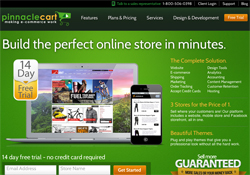 I only recently found out about Pinnacle Cart by browsing Godaddy and I must say that I’m impressed. After taking a closer look, I saw that many major brands are using this solution — so I guess I’m not the only one that finds Pinnacle Cart impressive.
I only recently found out about Pinnacle Cart by browsing Godaddy and I must say that I’m impressed. After taking a closer look, I saw that many major brands are using this solution — so I guess I’m not the only one that finds Pinnacle Cart impressive.
Since you can choose a hosted solution or self-hosted solution, the pricing structure is very flexible — you can pay a one-time fee for the license or you can pay a monthly fee.
If you decide to go with a monthly plan, be aware that setup fees apply to entry level plans. For more details, please see this link.
You can use a personalized domain name with either the hosted or self-hosted version.
Overview:
- Charges monthly fees for the hosted version (plus setup fees on entry level plans), and a one-time license fee for the self-hosted version.
- Hosted versions are available.
- Web based design tools help you edit your store’s design.
- Operating your store doesn’t require any programming skills because it’s all done via a web based interface.
- Sell physical or downloadable products.
- Technical support is included with hosted and self-hosted solutions (support is only available for a limited time on self-hosted versions).
- SEO friendly.
- Mobile friendly.
- Capable of handling SSL encryption.
Pros:
Has many useful features.
Plenty of payment options to choose from: Amazon Payment, Authorize.net, Google Wallet (formerly Google Checkout), 2Checkout, Paypal and more.
Many shipping options to choose from: real-time calculations from USPS, UPS, FedEx, Canada Post; create custom shipping methods; create custom shipping costs and more.
Cons:
If you have a small store that doesn’t generate many sales, and are looking to host this solution on your own server or shared hosting account, the license fee may seem a bit pricey.
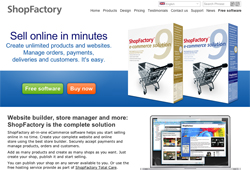 ShopFactory offers a gold and a pro version — gold being the more expensive version. The difference is mainly in the features. You can view the details here.
ShopFactory offers a gold and a pro version — gold being the more expensive version. The difference is mainly in the features. You can view the details here.
Unlike other shopping carts which are operated through a web based interface, ShopFactory is operated through PCs running Windows.
If you have a Mac (like I do), you will need to install Windows via Boot Camp — if you are really set on using this software.
With ShopFactory you can choose between a hosted and self-hosted solution.
You can use your own personalized domain with ShopFactory.
Overview:
- Charges a monthly fee for the hosted version and a one-time fee for the self-hosted version.
- Hosted versions are available.
- Software includes themes which you can use to change the look of your site.
- Sell physical or downloadable products. Note that immediately delivery of downloadable products after approved payment is only available in the gold version.
- Technical support is included with hosted versions and self-hosted versions. Though, the self hosted versions offer it for a limited time only.
- SEO friendly (customizable URLs are only available in the gold version).
- Capable of handling SSL encryption.
Pros:
If you are looking for a way to work on your store offline, ShopFactory may be the answer since it’s the only PC based software that I have reviewed in this article so far.
A nice list of payment options to choose from: Amazon Simple Pay, Authorize.net, Google Wallet (formerly Google Checkout), Paypal, Moneybookers and more.
Many shipping options: calculate rates in real-time from UPS, USPS, DHL; charge rates on a per order basis, per item rates and more.
Cons:
In the ShopFactory forum I read that version 9 (and I can only assume that this applies to future versions) is mobile friendly but I don’t see any mention of this in the features list.
Many much needed features are only available in the gold version.
I don’t know if it’s worth buying the self-hosted version because the total care service is only available for 12 months free of charge — total care includes many important features.
